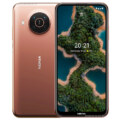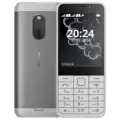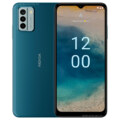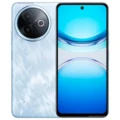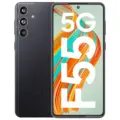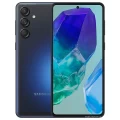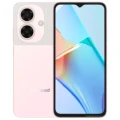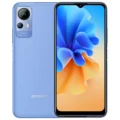Nokia 105 (2019)
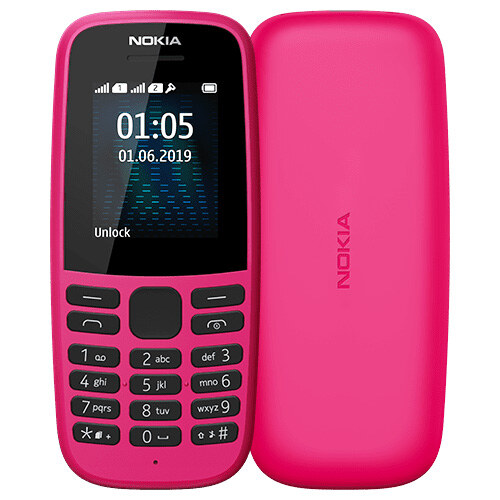

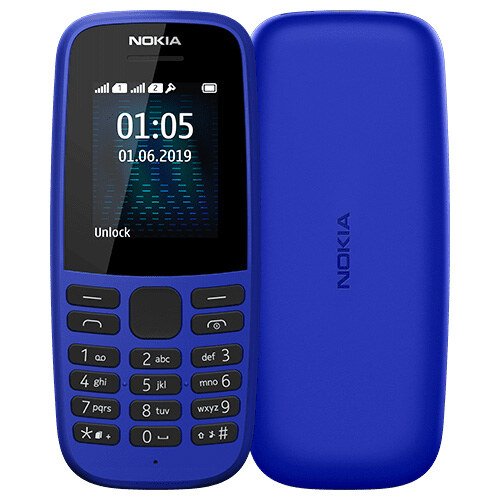








Specifications
Prices
| Official Official prices and mobile phones are available only in authorized shops. The device comes with an official warranty and the device is listed on the BTRC database in Bangladesh. | SINGLE SIM ৳1,599 / DUAL SIM ৳1,799 |
Launch
| Announced | 2019, July |
| Status | Available. Released 2019, September |
Network
| Technology | GSM |
| 2G bands It’s the 2nd generation mobile data communication technology. | GSM 900 / 1800 - SIM 1 & SIM 2 (dual-SIM model only) |
| GPRS GPRS (General Packet Radio Service) is a packet-oriented mobile data service on the 2G and 3G cellular communication system's global system for mobile communications (GSM), Generally, GPRS is used for the purpose of wireless data transfer, such as sharing pictures and videos or browsing the Internet via a mobile phone connection. | No |
| EDGE EDGE (Enhanced Data GSM Environment) is a wireless network technology generally considered the next step in the 2G network offers data transfer rates up to four times faster than ordinary GSM networks, Generally, EDGE is used for the purpose of wireless data transfer, such as sharing pictures and videos or browsing the Internet via a mobile phone connection. | No |
Body
| Dimensions It's the size of the phone in format (H x L x W) and the volume of the phone where available. | 119 x 49.2 x 14.4 mm (4.69 x 1.94 x 0.57 in) |
| Weight | 73 g (2.57 oz) |
| SIM SIM (Subscriber Identity Module) is a small card that contains a mobile network subscriber's account information. This allows the phone to use the card to attach to a mobile network. The SIM card is most commonly associated with GSM and UMTS mobile networks. Moving a SIM card from one phone to another allows a subscriber to switch mobile phones without having to contact their mobile network carrier. SIM cards can also be used by a phone to store limited amounts of data, such as phone numbers and text messages. | Dual SIM (Mini-SIM, dual stand-by) |
Display
| Type A number of display technologies and types used in mobile phones TFT (Thin Film Transistor), IPS (In-Place Switching), OLED (Organic Light Emitting Diode), AMOLED (Active-Matrix Organic Light-Emitting Diode), Super AMOLED (an even advanced version of AMOLED), Resistive Touchscreen (Resistive touchscreens contain two-layer of conductive material with a very small gap between them which acts as a resistance), Capacitive Touchscreen (Capacitive touchscreen technology consists of a layer of glass coated with a transparent conductor) | TFT, 65K colors |
| Size The industry-standard way of representing display sizes is publishing their length in inches. The screen-to-body ratio is a measure that relates to the size of the screen bezels. The bigger the ratio, the smaller the bezels are, meaning the display takes up a larger area on the device's front. | 1.77 inches, 9.7 cm2 (~16.6% screen-to-body ratio) |
| Resolution Display Resolution is the measuring way of how much pixels does a display contains. A higher resolution means more pixels and more pixels provide the ability to display more visual information (resulting in greater clarity and more detail). | 120 x 160 pixels, 4:3 ratio (~113 ppi density) |
Platform
| OS Every Mobile Phone system runs on a base software called Operating System (OS). Operating System controls all basic operations of the Mobile (such as smartphones, PDAs, tablet computers, and other handheld devices). The Operating System allows the user to install and run third party applications (apps), apps are used to add new functionality to the device. | Feature phone |
Memory
| Card slot A special slot for inserting a memory card for expanding your storage. It is a special slot for inserting a memory card. Memory cards allow you to expand the phone's built-in memory, A memory card (sometimes called a flash memory card or a storage card) is a small storage medium used to store data such as text, pictures, audio, and video, for use on small, portable or remote computing devices such as mobile phones, mp3 players, digital cameras. | No |
| Internal Internal memory is the memory available onboard (chip or motherboard) which is given while manufacturing at the factory. is a data storage space (flash memory) mostly used in smartphones, tablets, and other electronic devices where operating system, apps, music, photos, videos, files, and other user data Is stored. | 4 MB |
| RAM RAM (Random Access Memory) is a type of mobile, computer memory that can be accessed randomly, any byte of memory can be accessed without touching the preceding bytes that allow information to be stored and accessed quickly from random locations. RAM is the most common type of memory found in computer systems, smartphones, tablets, and other electronic devices. | 4 MB |
Main camera
Selfie camera
Sound
| Alert types | Vibration, MP3, WAV ringtones |
| Loudspeaker Loudspeaker is a small sound driver fitted within a mobile phone, which is used to produce sound. | Yes |
| 3.5mm jack A common connector for plugging in audio output or input. | Yes |
Connectivity
| WLAN Wireless Local Area Network (WLAN) is a method of distributing data wirelessly to a local area network practically to the internet. It is a popular wireless networking technology using radio waves to provide high-speed network connections that allow devices to communicate without cords or cables, Wi-Fi is increasingly becoming the preferred mode of internet connectivity all over the world. | No |
| Bluetooth Bluetooth is a wireless technology standard for exchanging data over short distances from fixed and mobile devices. It is a wireless communications technology for exchanging data between mobile phones, headsets, computers, and other network devices over short distances without wires, Bluetooth technology was primarily designed to support simple wireless networking of personal consumer devices. | No |
| GPS GPS (Global Positioning System) originally Navstar GPS, is a satellite-based radio navigation system. It is a satellite-based radio navigation system, GPS permits users to determine their position, velocity, and the time 24 hours a day, in all weather, anywhere in the world, In order to locate your position, your device or GPS receiver must have a clear view of the sky. | No |
| NFC NFC (Near Field Communication) is a shorter range of high-frequency data transferring technology. It is a set of standards for smartphones and similar devices to establish peer-to-peer radio communications with each other by touching them together or bringing them into proximity, usually no more than a few inches. | No |
| FM radio FM broadcasting is a method of radio broadcasting using frequency modulation technology. | Yes |
| USB USB is a standard for a wired connection between two electronic devices, including a mobile phone and a desktop computer. | microUSB 1.1 (charging only) |
| Infrared port IrDA (Infrared Data Association) is an old data sharing technology in the means of Infrared Port. It uses a beam of infrared light to transmit information and so requires a direct line of sight and operates only at close range. |
Features
| Messaging SMS (short message service) is a text messaging service component of most telephone, internet, and mobile-device systems. | SMS |
| Browser A web browser is a software application for accessing information on the world wide web. | HTML5 |
| Java JAVA is a Runtime Environment or platform of application where particular apps can run it. | No |
Battery
| Type Cell phones run on various kinds of batteries depending on the manufacturer, phone size or shape, and features. There are basically four types of cell phone batteries Lithium Polymer (Li-Po), Lithium-Ion (Li-Ion), Nickel Metal Hydride, and Nickel Cadmium. | Non-removable Li-Ion |
| Capacity The unit of capacity is milliamp-hours (mAh), which means 3000mAh can be put on the battery to discharge it in one hour. The battery capacity represents the maximum amount of energy that can be extracted from the battery under certain conditions. | 800 mAh |
| Stand-by | Up to 619 h |
| Talk time | Up to 14 h 24 min |
More
| Made by | Finland |
| Color | Black, Blue, Pink |
Disclaimer
We do not guarantee that the information of this page is 100% accurate and up to date.
The price of the Nokia 105 (2019) is BDT 1,599. Nokia 105 (2019) feature phone comes to some extra games and it has 1.77 inches, 9.7 cm2 (~16.6% screen-to-body ratio), TFT, 66K colors and resolution is 120 x 160 pixels, 4:3 ratio (~113 ppi density). It has 4 MB of RAM and 4 MB internal storage, which can not expand external storage. This stylish device has no camera. It was powered by a standard 800 mAh Non-Removal Li-Ion battery.
Reviews/comments

find showroom
Khulnai ata kothai kinta pabo.ai phna ki call recording system asa.r showroom ki prize same rakhba.

Ashik (Answer)
Nokia showroom a paben. ata official price.

searching phone
Showroom koba thaka phoneta pauya jaba.aj gaselam pelam na

Ashik (Answer)
Nokia 105 (2019) official vaba released holai paben.

Information
Nokia 105 e charge kmn thake?

Rocky (Answer)
Nokia 105 (2019) te charge kamon take sure bolte parci na.

Have call Recording System ?
Have call Recording System ?

Nokia105
Price ta orginal na falto

Question
I bought Nokia 105. Full charge was completed in just 48 hours. Is it a fault of the mobile or its charge is reduced?
